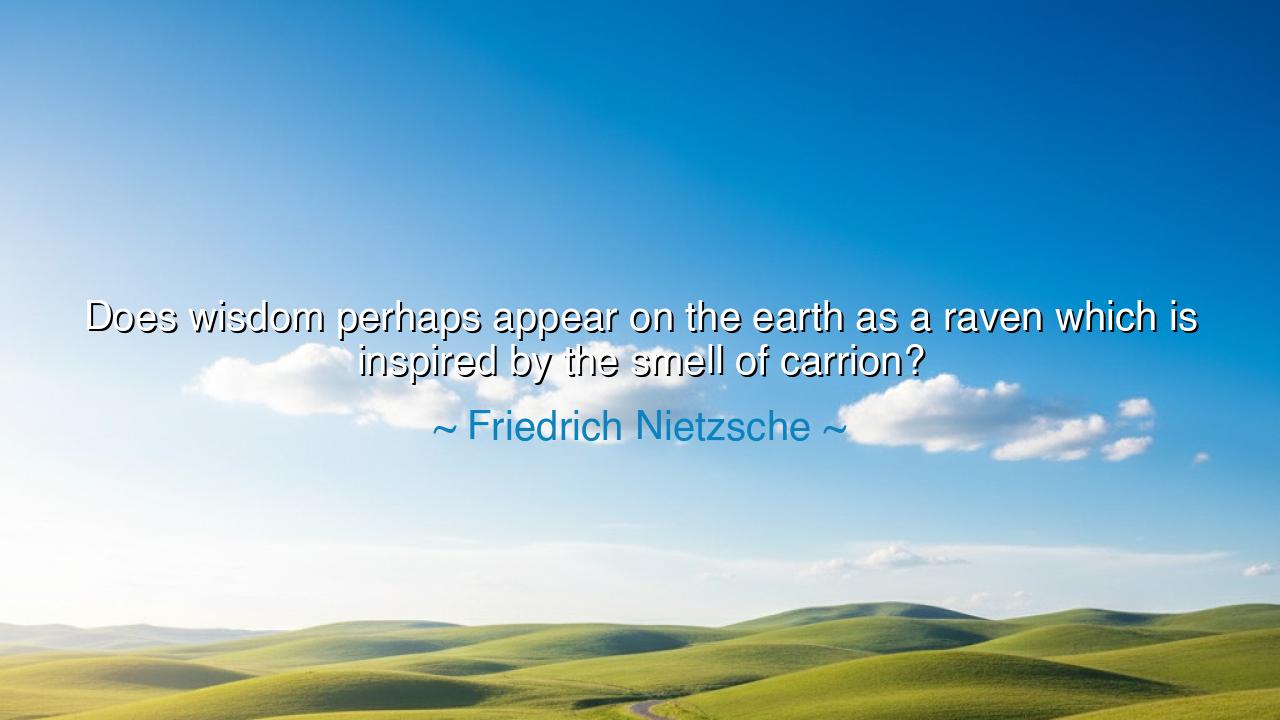
Does wisdom perhaps appear on the earth as a raven which is
Does wisdom perhaps appear on the earth as a raven which is inspired by the smell of carrion?






O Seekers of Truth, hear the words of Friedrich Nietzsche, who speaks of the complex nature of wisdom: "Does wisdom perhaps appear on the earth as a raven which is inspired by the smell of carrion?" In this striking image, Nietzsche challenges us to look deeper into the origins of wisdom, for it is not always born from the pure and noble, but sometimes from the decay and death of things once thought vital. Just as the raven is drawn to the scent of decay, so too may wisdom arise from the darker, more unsettling corners of life—where suffering, loss, and the rotting remnants of old ideas give rise to new insights.
Consider, O Children, that wisdom does not always come from the serene mountaintop or the quiet moments of reflection. Often, it arises from the tumultuous storms of life, from the destruction of old ways, and from the sharp scent of decay that stirs the mind. The raven, ever drawn to what is decaying, reminds us that from the death of one thing, something new can grow. It is in the face of suffering and chaos that we may uncover profound truths, for only in the face of adversity do we learn what is truly essential.
Look to the life of Leonardo da Vinci, whose genius was not forged in peaceful contemplation but in the intense dissection of both life and death. He sought out the corpses of animals, examined the workings of the human body, and studied the very fragility of life. Through his investigations into what had already passed, he discovered the truths of anatomy, motion, and even the natural forces that govern us. Wisdom was not a passive thing for him; it arose from examining what had decayed and understanding the underlying forces that shaped the world.
And so, O Seekers of Truth, understand that wisdom is not always the gentle muse of a pure heart; it is the child of struggle, pain, and the decay of old beliefs. It is through the trials and errors of life, through the loss of what we once held dear, that we are often forced to rethink, recreate, and reinvent ourselves. Just as the raven feasts upon the remains of the dead, so too must we sometimes delve into the ruins of the old to find the seeds of the new. It is in this process of destruction and renewal that true wisdom is born.
Let us, therefore, embrace the idea that wisdom may arise from the most unlikely of places. It may not always come in the form of clarity or peace, but in the rotting remnants of what once was. From these, we must seek out the lessons, the truths that lie hidden beneath the surface. Wisdom, as Nietzsche suggests, is often drawn from the decay, from the dark places of the world, where the old gives way to the new. Thus, we must be unafraid to look into the shadows, for in them lies the potential for the brightest truths to emerge.






MMikey
Nietzsche’s metaphor is thought-provoking. It suggests that wisdom is something that comes from confronting the darker aspects of life. Is he saying that wisdom isn't a clean, enlightened process, but rather something that is pulled from the decay and ruin of our experiences? What does that say about how we view the pursuit of knowledge? Do we seek wisdom in light, or is it always found in the shadows of our lives?
LTlien ta
This quote feels like it has a darker view of wisdom. The raven, a bird often associated with omens, is drawn to carrion, which represents death and decay. Does Nietzsche mean to say that wisdom is only recognized after something has deteriorated or fallen apart? It makes me wonder if wisdom is something we only come to understand after losing something or facing hardship. Could there be a more optimistic view of wisdom as well?
NLNguyen Linh
I find this idea somewhat cynical. Is Nietzsche suggesting that wisdom is a byproduct of death or decay? It almost feels like he’s saying wisdom is inherently linked to something negative. Does that mean that wisdom isn't 'pure,' but instead something born from loss or decay? How does this perspective impact the way we think about gaining knowledge? Can wisdom ever be found in the midst of life and vitality, or is it always born of tragedy?
MNMinh nghia
I’m really intrigued by Nietzsche’s comparison of wisdom to a raven, especially with the carrion imagery. Could he be saying that wisdom often appears in moments of crisis or destruction, when things fall apart? It makes me think—do we only grow wiser when faced with loss or conflict, or can wisdom also come from observation and reflection? What does that say about the way we view growth and enlightenment?
THThuy Hoang
Nietzsche’s metaphor is quite provocative. It seems like he’s suggesting that wisdom may not be pure or noble, but is often shaped by the harsh realities of life. Does that mean we can only find wisdom through negative experiences, or could there be other ways? I’d like to know, do you think wisdom is always linked to suffering, or is it possible to acquire it through joy or peace?